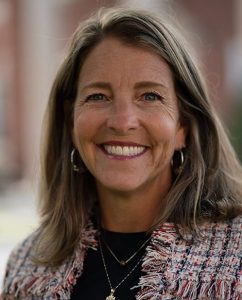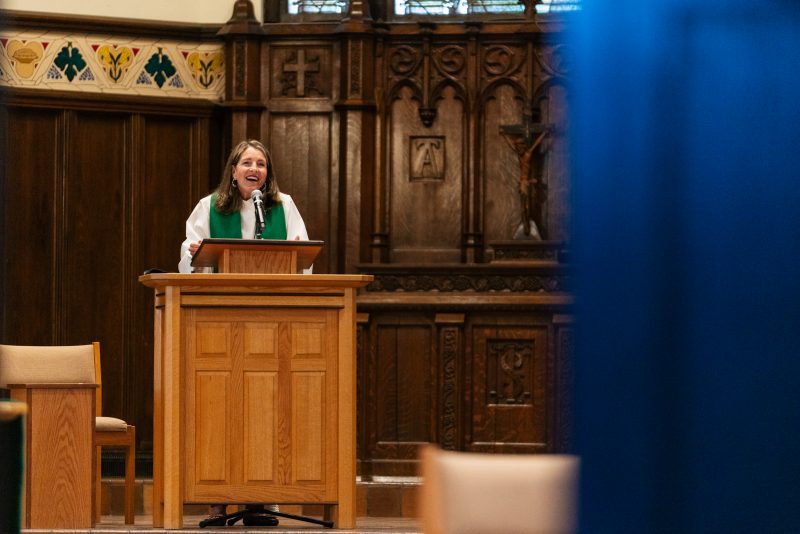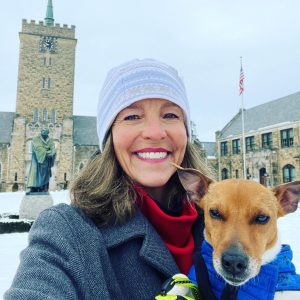Meet Wartburg Seminary’s Fifteenth President
 Wartburg Seminary welcomed the Rev. Dr. Kristin Johnston Largen ’97 in her new call as the Wartburg Seminary President in February 2021. At the time, she shared, “Coming back to Wartburg feels like coming home.” Learn more about Dr. Largen by reading the interview below!
Wartburg Seminary welcomed the Rev. Dr. Kristin Johnston Largen ’97 in her new call as the Wartburg Seminary President in February 2021. At the time, she shared, “Coming back to Wartburg feels like coming home.” Learn more about Dr. Largen by reading the interview below!
It’s probably safe to assume you didn’t dream of being a seminary president when you were young. What did you dream of being/doing/achieving?
My mom loves to tease me that when I was in middle school and did one of those career surveys, forestry service came up as number one! This shouldn’t have been a surprise—I have always loved the outdoors, especially the mountains, and I love hiking and running, but I didn’t ever think seriously about pursuing that as a career. Honestly, I have always loved teaching. When I was young, my dad was a middle school biology teacher in Denver, and I remember going to school with him when I had in-service days (I was in a different school district), and he even let me help him grade multiple choice tests and things. One year for my birthday, we did blood typing tests as our “game”! As I got older, I just fell in love with the college/university setting, and knew I wanted to teach at that level. But now, just a few months in, I can honestly say that this particularly presidency—not just a seminary presidency in general—is my dream job!
Can you describe the moments, mentors, or otherwise meaningful memories that shaped your understanding of being called to ministry and to teaching/theological education?
I’m glad you linked these together, because I really see my identity bound up both as a pastor and theological educator; they go together and always have! And, of course, this seems like a softball, since those moments and mentors primarily were here at Wartburg!
Let me just share three moments that were extremely formative for me. The first one was with Frank Benz, one of my Old Testament professors. I came to Wartburg originally for an MA; I had always felt called to teaching, but not necessarily to ordained ministry. Once arriving, I was pretty intimidated by so many of my classmates who had been religion majors at Wartburg or Luther, and seemed so far ahead of me in so many ways. But in a conversation with Dr. Benz, he just encouraged me to embrace who I was and my own gifts, and not compare myself to others. And, he slyly encouraged me to think about an MDiv—a degree, he said, that would give me more time to take classes and prepare me just as well for doctoral work. That was a very affirming conversation for me, which opened me to a call to ordained ministry; and ultimately, I did change to the MDiv. Then, the second one was a “bench conversation” with Professor Persaud. I was committed to universal salvation, and he was pushing me on that—in a good way, of course. We were using the analogy of a bank account; if someone has deposited a check in your bank account for a million dollars, but you don’t know it’s there, can you really use it? Does it make a difference? I’d like to think I won that one [just kidding], but what I remember more is just the time and the conversation, and his intentional support in the development of my theological thinking.
That mentoring continued throughout my academic career, by the way: Winston served as my professional mentor when I first became a professor at Gettysburg Seminary, too! Finally, I have to mention Duane Priebe—and here, there are more conversations, more moments than I can even call to mind. Professor Priebe was the primary advisor for my senior thesis, and he (and Professor Persaud as well) really encouraged my interfaith theological exploration. He believed in me as a theologian and helped me to believe in myself and my potential; I team-taught a course with him at the Seminary in Lae, Papua New Guinea the summer after I graduated, and it was the most amazing experience. He treated me like a peer, and really confirmed my desire to do doctoral work.
What was important about choosing to attend WTS for your own seminary education?
I’m sure this sounds crazy to students now, many of whom visit multiple seminaries as they discern their call to ministry, but I was fortunate enough to have two fabulous home pastors—Jim Rasmussen (of blessed memory now) and Scott Beebe—who always supported and encouraged me, and they both went to Wartburg. So, when I discerned a call to attend seminary, there was no question where I was going to go—I would go to a place I knew formed excellent public ministers and Christian leaders!

In your return to WTS now as president, what ways has the ethos of WTS stayed the same? Changed?
Well, I was delighted to find that the strong sense of community, the sense of life together, remains so strong. This includes the robust worship life, too—and keeping worship at the center of the theological education/formation that happens here. This also includes the very active role faculty play in the life of the community and the life of the students; they are here for students in the fullness of their lives, not just in the classroom. I valued that so much as a student, and I continue to treasure it today. Obviously, what has changed significantly is that all of this happens not only here residentially, but also at a distance; and I am so pleased at the way Wartburg expands what happens here to include our DL and CL students—like arms spread wide—rather than just seeing those students as part of different communities. We are committed to being one community, and we live that out with real integrity, I think.
What makes you excited to get up and get to work in the morning?
Right now, one of the things that is exciting me most is all of the new people I am meeting. I am really enjoying my conversations with our generous, kind donors—and counting the weeks until I can travel and meet them in person! It has been especially rewarding to get to know our amazing faculty and staff; we have the most incredible team of folks here, and I feel really blessed to be a part of such a great group.

My spouse John and I love living on campus; we love the campus climate, which is familiar to both of us. (For those who don’t know, John served many years at Lutheran Theological Southern Seminary in Columbia, SC as the full-time Pastor to the Seminary Community with a specialty in spiritual formation; and then later at United Lutheran Seminary in PA as Dean of the Gettysburg Chapel and Adjunct Professor of Formative Spirituality. He holds a D.Min. in Spiritual Direction.) We already have welcomed students to our driveway for a safe grab-and-go breakfast, and we look forward to more opportunities for hospitality as COVID restrictions ease. Also, Rufus and I love meeting students (and other dogs!) out on our daily walks, and that’s really fun, too.
None of us knows exactly what the church is going to look like in 20 years, but I am confident that Wartburg will continue to form leaders who are superbly capable: nimble and creative, and ready to serve God’s children in a variety of contexts and faithfully proclaim the gospel to a world that always needs to hear it!
You have a blog, Happy Lutheran, where you regularly write and reflect on current issues, books you’re reading, and how we are called to be people of faith in the midst of this wild world. Why is it important to you to engage in this way?
I’m so glad you asked this question, because I asked it myself a year ago, when I thought about stopping it—I mean, no one really blogs anymore, and not very many people read it. I started the blog back in 2012, when I was starting my first sabbatical. I had received a generous grant that was going to enable me to travel to four different countries and do research for a book, and I wanted my students to be able to follow my travels and share in how I was thinking about my experiences. So, it started out as something very specific. But then I just kept writing.
So, a year ago, I stopped for a few months to think about if I really wanted to continue—and if so, why. I realized that it was very important for me to bear public witness, if you will, as a public theologian—that is, someone who sees the relevance of theology and theological education for the fullness of life in the world—one’s own individual life but also for the life and health of a society as a whole. So, my theological understanding of God, humanity, and creation affects how I think about everything—nothing is outside that lens.
Therefore, I feel both empowered and called to share why my faith in Christ matters, and makes a difference in how I think about racism, politics, climate change, friendship, science and technology, health—I mean, you name it! The gospel matters, and I want people to know that. And, finally, I want to model this kind of theological activity for students, so that they also are empowered to do things like blog, or write letters to the editor, for example (which I also do) and bear their own kind of public witness. I don’t want to cede the public square to the most conservative Christian voices; mainline Christians need to stand and speak there, too.
Read more about Dr. Largen in the announcement of her hire or on her Wartburg Seminary faculty page.